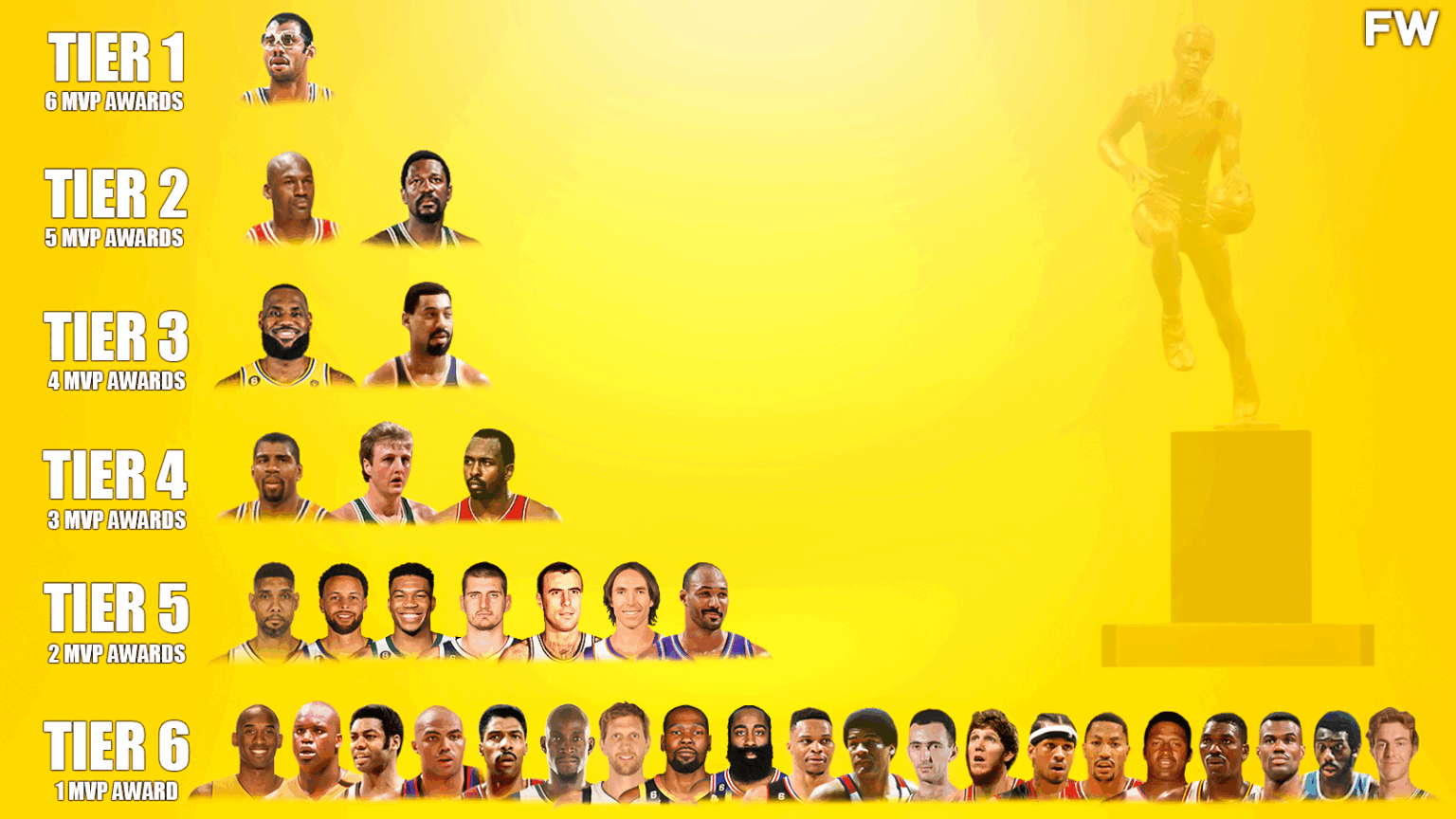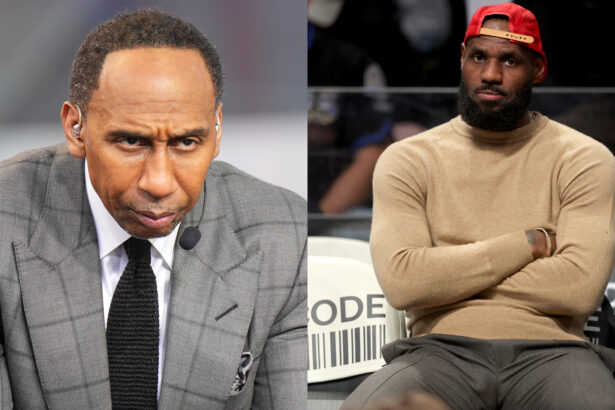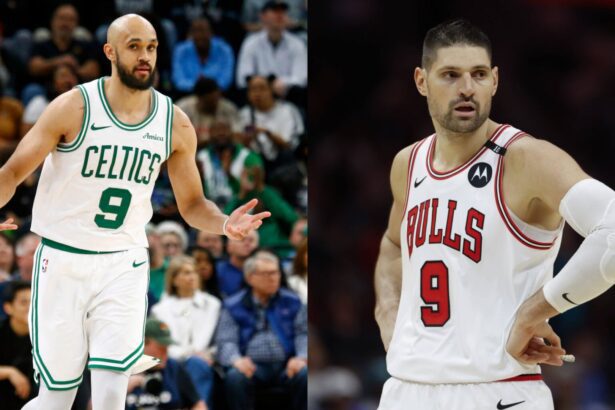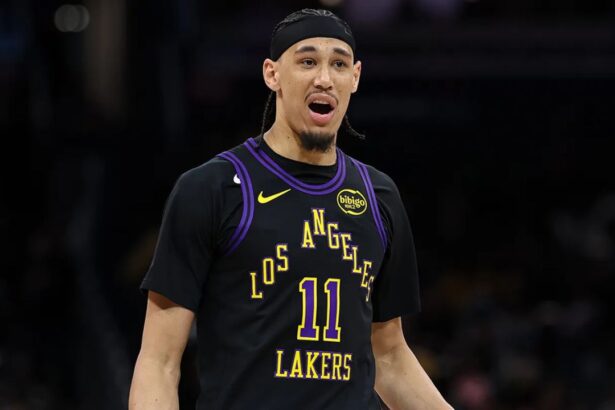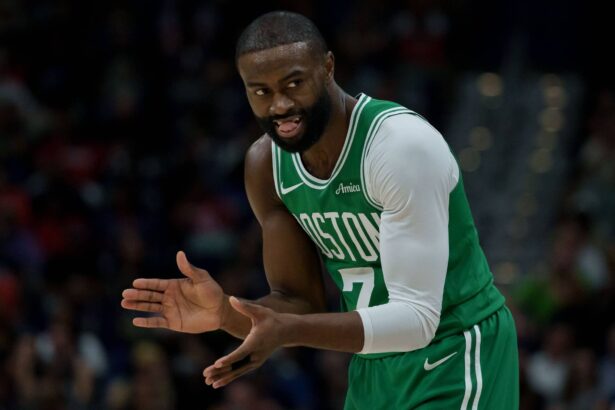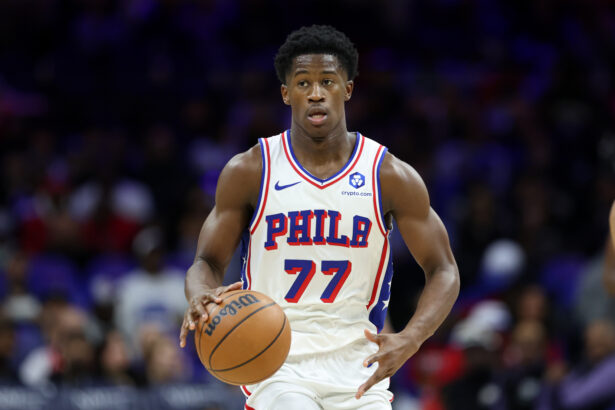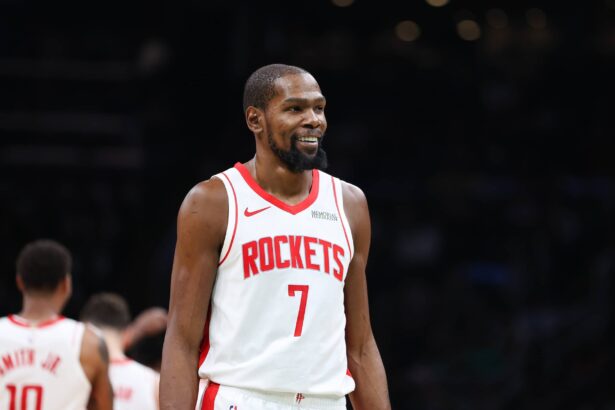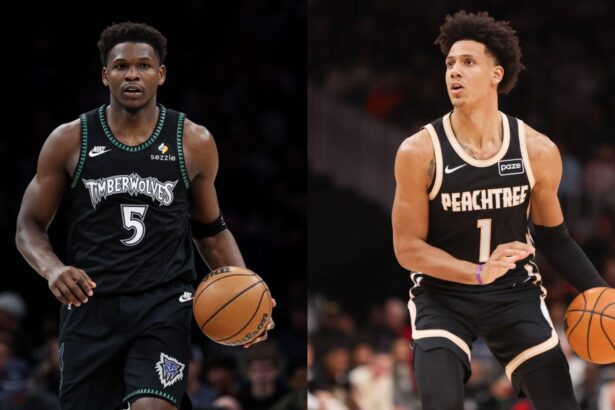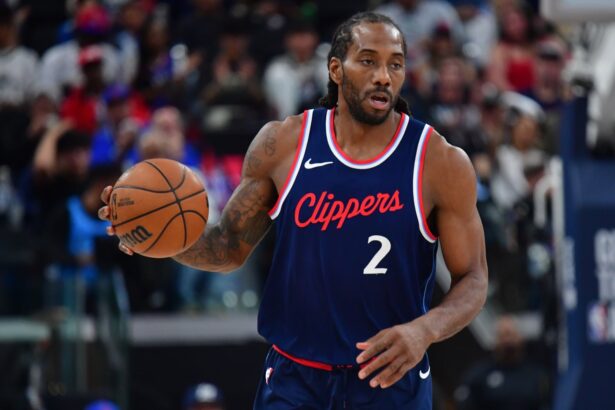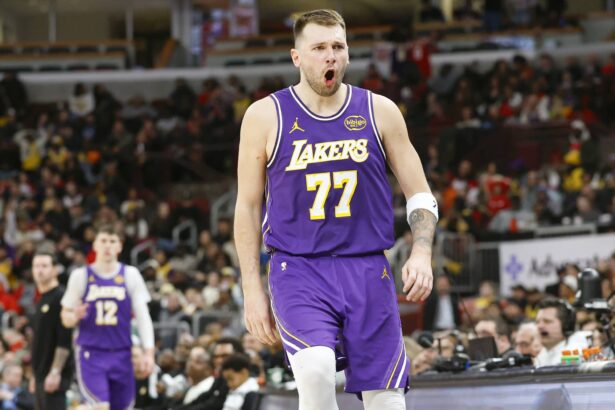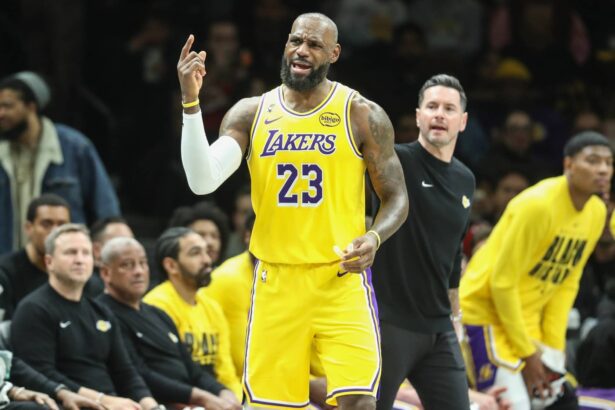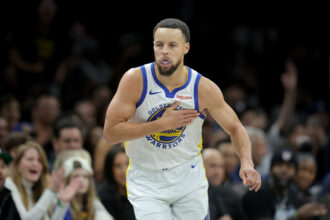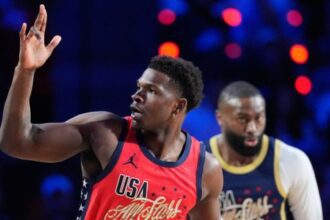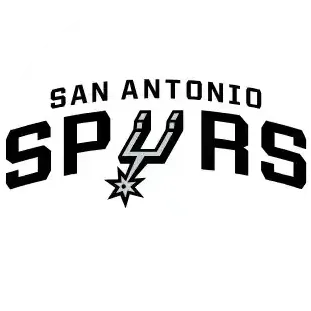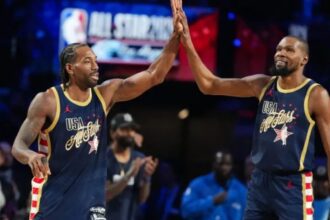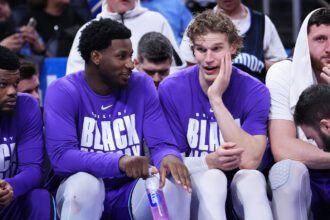It seems that every NBA season, one conversation dominates the airwaves, television shows, and normal, everyday basketball conversations. The conversation I am talking about is the one to be had around the MVP award. It seems that every season, NBA fans and media pundits alike either have issues with the criteria for the MVP award, or the award is just not consistent in its criteria enough for us to understand it. The MVP award is one of the most coveted individual awards in NBA history, and it could make or break a player’s legacy based on winning just one or multiple times.
- Tier 6 – 1 MVP Award
- Tier 5 – 2 MVP Awards
- Tier 4 – 3 MVP Awards
- Tier 3 – 4 MVP Awards
- Tier 2 – 5 MVP Awards
- Tier 1 – 6 MVP Awards
- Kareem Abdul-Jabbar
- Next
- Ranking The NBA Players With The Most MVP Awards And Finals MVP Awards Combined: Michael Jordan Is The GOAT With 11
- NBA Players With The Most Championships: Bill Russell Is The Real Lord Of The Rings
- NBA All-Time Leading Scorers By Draft Pick
- Ranking The Greatest NBA Three-Point Shooters Of All-Time By Tiers
- NBA Players Who Won The NBA Championship, MVP Award, And Finals MVP In The Same Season: Michael Jordan Did It Four Times
Today, we are going to place the MVP award winners by tiers based on how many MVP awards they have won. This will separate the players who stood out above the competition, maybe just once, compared to the players who did it on a consistent basis. MVP awards are not the only metric when measuring a player’s greatness, of course. However, determining one’s value can be directly tied to the value one provides or provided to their respective team. Winning multiple MVP awards puts a player on a different plane than most who have ever stepped foot in the NBA.
These are the NBA’s MVP winners ranked by tiers.
Tier 6 – 1 MVP Award
Kobe Bryant, Shaquille O’Neal, Oscar Robertson, Charles Barkley, Julius Erving, Kevin Garnett, Dirk Nowitzki, Kevin Durant, James Harden, Russell Westbrook, Wes Unseld, Bob Cousy, Bill Walton, Allen Iverson, Derrick Rose, Willis Reed, Hakeem Olajuwon, David Robinson, Bob McAdoo, Dave Cowens
The collection of NBA players who won just one MVP award is incredible. One of the players who should probably have more than one MVP is Kobe Bryant. In his 20 years with the Lakers from 1996-97 thru 2015-16, Bryant delivered five NBA championships with two Finals MVPs to L.A. Kobe would take home his only MVP award in 2008 when he averaged 28.3 PPG, 6.3 RPG, 5.4 APG, and 1.8 SPG. He led the Lakers to 57 wins and a trip to the NBA Finals, where they fell to the Boston Celtics.
Kobe’s running mate for three of his five championships was the most dominant force in the NBA at the time, Shaquille O’Neal. Shaq was the driving force behind the Lakers’ three straight NBA championships from 2000 thru 2002. In 2000, O’Neal had one of the greatest single seasons ever when he won the MVP award and a scoring title averaging 29.7 PPG, 13.6 RPG, and 3.0 BPG. The Lakers would go on to win the NBA title that season, and Shaq would have one of the highest-scoring Finals ever by a Finals MVP award winner.
Oscar Robertson is one of the greatest point guards to ever play the game. He was the first man to ever average a triple-double for an entire season and an all-around menace for opponents on the court. In the 1964 season, Robertson would lead the Cincinnati Royals to 55 wins, their most in the Robertson era up to that point. He would win the MVP award by averaging 31.4 PPG, 9.9 RPG, and 11.0 APG, which led the NBA. It was Robertson’s third time averaging over 30.0 PPG and his third assist title as well.
Charles Barkley’s claim as one of the game’s greatest power forwards was cemented in the early 90s. After an ugly split from the 76ers, Barkley found himself traded to the Phoenix Suns, a Western Conference finalist in previous seasons. In his first season with the Suns, Barkley would let his presence be known by winning the MVP award with 25.6 PPG, 12.2 RPG, 5.1 APG, 1.6 SPG, and 1.0 BPG. Barkley would lead the Suns all the way to the NBA Finals, where they would fall to the Chicago Bulls in six games.
Julius Erving won a host of awards and championships as a member of the Nets in his ABA days. As far as the NBA, Erving would join the 76ers in 1977 and immediately make them a championship threat. In 1981, Erving would have his best season with the Sixers averaging 24.6 PPG, 8.0 RPG, 4.4 APG, 2.1 SPG, and 1.8 BPG. The Sixers would win 62 games that season, and Erving would win the only MVP award of his NBA career. The Sixers would lose to the Celtics in the Eastern Conference Finals in seven games.
Kevin Garnett is a true success story for his journey from high school straight to the NBA. Garnett was highly scouted due to his ability to do almost everything on the court at an elite level. In 2004, Garnett and the Minnesota Timberwolves were still seeking their first truly successful season. Garnett would help that cause by becoming the first and only MVP in Timberwolves history in 2004. He averaged 24.2 PPG, 13.9 RPG (led NBA), 5.0 APG, 1.5 SPG, and 2.2 BPG. The Timberwolves would win 58 games and fall just short of the NBA Finals, losing to the Lakers in the Western Conference Finals.
Dirk Nowitzki is one of the pioneers of the stretch forward position. With his signature fadeaway from the low post to his ability to shoot the ball from three as a 7-footer, Nowitzki is truly one of the greats. In 2007, he led the Mavericks to one of their best seasons ever at 67-15. He was named MVP with 24.6 PPG, 8.9 RPG, and 3.4 APG. He shot 50.2% overall and 41.6% from three that season as well and became a member of the 50/40/90 club. The fun was short-lived, as Dallas would be upset in the first round of the playoffs by the Golden State Warriors.
One of the game’s greatest scorers ever has also logged just one MVP in his career, and that is Kevin Durant. He accumulated a bunch of other accolades as well, with four scoring titles, two NBA championships, and two Finals MVP awards. In 2014, Durant was named MVP for the only time in his career with the Oklahoma City Thunder. The season saw him lead the NBA in scoring with 32.0 PPG as well as 7.4 RPG, 5.5 APG, and 1.3 SPG. The Thunder would win 59 games but lose to the Spurs in the Western Conference Finals.
James Harden won his only MVP award when he was at his absolute peak as an offensive player. His Euro-step, stepback threes, and the way he manipulated defense was a work of art, and he was rewarded for it with an MVP in 2018. That season, Harden won his first of three straight scoring titles with 30.4 PPG as well as 5.4 RPG, 8.8 APG, and 1.8 SPG. Harden and the Rockets would win 65 games but be eliminated in the Western Conference Finals by the Golden State Warriors.
Russell Westbrook is another one-time MVP award winner who makes Tier Six as a result. In 2017, Westbrook made history by becoming the first man since Oscar Robertson to average a triple-double for an entire season, something he would do three more times in his career. After losing his co-star Kevin Durant, Westbrook was able to lead the Thunder to the playoffs anyway with a league-leading 31.6 PPG, 10.7 RPG, and 10.4 APG. Westbrook and the Thunder would fall in the playoffs, but nobody can forget the history he made in 2017.
Wes Unseld won one of the most curious MVP awards in NBA history. Unseld was just a rookie during the 1968-69 season and was immediately one of the NBA’s best defenders upon arrival. He was named MVP in 1969 after leading the Bullets to 57 wins and a first-place finish in the East. Unseld averaged just 13.8 PPG and 18.2 RPG making him one of the lowest-scoring MVPs in NBA history. Unseld and the Bullets would be swept in the first round of the playoffs in 1969 by the New York Knicks.
One of the pioneers of the point guard position and innovators of the game was Boston’s Bob Cousy. For 13 years, Cousy dazzled audiences with his dribbling and passing display every time he stepped on the court. The six-time NBA champion won his only MVP award for his performance during the 1957 season. Cousy averaged 20.6 PPG and led the NBA with 7.5 APG that season while leading Boston to a 44-28 record on the year.
Bill Walton is also a one-time MVP and should probably be higher with more than one, but due to injuries, he never reached his full potential. Walton led the Trail Blazers to the 1977 NBA championship and followed it up with a tremendous MVP season. In 1978, Walton would average 18.9 PPG, 13.2 RPG, 5.0 APG, 1.0 SPG, and 2.5 BPG. The Trail Blazers would win 58 games that season as well but lose to the Seattle SuperSonics in the second round of the playoffs.
In the early 2000s, Allen Iverson set the world on fire with his undeniable style off the court and unprecedented swag on it. Iverson was a fearless 6’0’’ baller who went right at the chest of some of the game’s greatest bigs to get a bucket. In 2001, he brought home his only MVP award when he averaged an NBA-leading 31.1 PPG, 4.6 APG, and an NBA-leading 2.5 SPG. The Sixers would advance to the NBA Finals, where they would lose to the Lakers in five games. Iverson did lead Philadelphia to one win in the series, which was the Lakers’ only loss of the postseason.
The story of Derrick Rose could almost be rewritten as a Greek tragedy. Rose was on top of the world as a young man in Chicago who was headed toward the greatest career for a Bull since Michael Jordan until a knee injury ripped all of it away. However, before things changed, Rose became the youngest MVP in NBA history during the 2011 season. He averaged 25.0 PPG, 4.1 RPG, 7.7 APG, and 1.0 SPG to lead Chicago to 62 wins. He battled most of the season without his two best teammates and still led the Bulls to the best record in the East.
Willis Reed also won an MVP award in his career, and it is one that most feel could have gone to someone else. In his sixth season in 1970, Reed led the Knicks to 60 wins by averaging 21.7 PPG and 13.9 RPG on 50.7% shooting. Many claimed the award should have been Kareem’s, even though he was a rookie, or even Jerry West’s. Reed would have the last laugh, though, by leading the Knicks to an NBA championship for the first of two titles and winning his first of two Finals MVP awards as well.
Hakeem Olajuwon is widely considered to be one of the greatest defenders ever, as well as an offensive machine. He could fool defenders with his patented Dream Shake or even step out and knock down short jumpers regularly. In 1994, Olajuwon had a tremendous season in which he was named Defensive Player of the Year, MVP, and Finals MVP. Olajuwon did this averaging 27.3 PPG, 11.9 RPG, 1.6 SPG, and 3.7 BPG.
One rival of Olajuwon’s during the 90s was Spurs big man David Robinson. Many felt that Robinson stole Hakeem’s MVP award the following season in 1995 but let’s not get ahead of ourselves. In 1995, Robinson led the Spurs to 62 wins and a division crown. He averaged 27.6 PPG, 10.8 RPG, 1.7 SPG, and 3.2 BPG, which are pretty similar numbers to Hakemm’s MVP from 1994. Now, Olajuwon would exact revenge in the Western Conference Finals by embarrassing Robinson on the court. However, the MVP is not a playoff award, and Robinson rightly deserved it in 1995.
Bob McAdoo is definitively one of the most underrated players in NBA history. He is a three-time scoring champion, Rookie of the Year, and a Hall of Famer. McAdoo won his only MVP award in 1975 as a member of the Buffalo Braves. McAdoo would win a scoring title with 34.5 PPG, 14.1 RPG, 1.1 SPG, and 2.1 BPG. He led the Braves to 49 wins that season, but they were eliminated in the second round by the Washington Bullets.
The final member of Tier Six is Dave Cowens of the Boston Celtics. Two seasons after winning Rookie of the Year, Cowens would win the only MVP award of his career. The Celtics won 68 games this season behind Cowens’ 20.5 PPG, 16.2 RPG, and 4.1 APG. Boston would lose in the Eastern Conference Finals to the Knicks, who would eventually become NBA champions. Cowens would become an NBA champion in 1974 and in 1976 with Boston before retiring in 1980.
Tier 5 – 2 MVP Awards
Tim Duncan, Stephen Curry, Giannis Antetokounmpo, Nikola Jokic, Bob Pettit, Steve Nash, Karl Malone
Tim Duncan is the first member of Tier Five with his two MVP award wins in the 2000s. His first MVP came in 2002 when he averaged 25.5 PPG, 12.7 RPG, and 2.5 BPG to lead the Spurs to 58 wins. He would become MVP the following season once again when he averaged 23.3 PPG, 12.9 RPG, and 2.9 BPG. This time, Duncan would lead the Spurs to their second NBA championship, with Duncan claiming his second Finals MVP award as well.
Over the last decade, we have watched as Stephen Curry has become, quite clearly, the greatest three-point shooter in NBA history. In 2015, Curry delivered an NBA title for the Warriors as well as an MVP award in the same season. He averaged 23.8 PPG and 7.7 APG that season for the champs. In 2016, he would explode and become the first unanimous MVP in NBA history. He led the Warriors to an NBA record of 73 wins as well, with a scoring title and steals title to his name. He averaged 30.1 PPG on 50.4% shooting overall and a ridiculous 45.4% from three on 11.2 attempts.
Giannis Antetokounmpo was a back-to-back MVP award winner as well in 2019 and 2020. Two years after his win for Most Improved Player, Giannis secured his first MVP with 27.7 PPG, 12.5 RPG, 1.3 SPG, and 1.5 BPG. The following season, the NBA was cut short due to the COVID-19 pandemic. Giannis was named MVP of the league once again with 29.5 PPG, 13.6 RPG, 1.0 SPG, and 1.0 BPG. In both instances, Milwaukee was dismissed early from the NBA playoffs, which had a lot to do with Antetokounmpo not winning a third straight award in 2021.
Nikola Jokic is the most recent MVP winner in the NBA, with wins in both 2021 and 2022. For both MVP wins, Jokic was missing either one or two key teammates and still willed his team to the playoffs with his incredibly efficient play. In 2021, he averaged 26.4 PPG, 10.8 RPG, and 8.3 APG. In 2022, he averaged 27.1 PPG, 13.8 RPG, and 7.9 APG. Jokic is again on track for his third straight MVP award, averaging a triple-double at this current moment which would make him just the third player to ever do so in a full season.
Bob Pettit being on this list is significant as he was the first player in NBA history to become a multi-time MVP winner. Pettit won his first MVP in 1956 with the Hawks. He averaged 25.7 PPG to lead the NBA and 16.2 RPG as well. In 1959, Pettit would win his second MVP with the Hawks after averaging a league-leading 29.2 PPG and 16.4 RPG. Pettit would win one NBA championship in his career in 1958 and can lay claim as the only player to take down Bill Russell in an NBA Finals.
Steve Nash is another two-time winner of the MVP award and one that many feel didn’t deserve either honor. At the time, Nash was leading the NBA’s highest-powered offense with the Suns and leading the NBA in assists regularly. Nash won his first MVP in 2005 when he averaged just 15.5 PPG and a league-leading 11.5 APG. He would go back-to-back in 2006 as well with 18.8 PPG this time and a league-leading 10.5 APG. Nash would never play in an NBA Finals in his career, but there is no doubt where he stands among the NBA’s top playmakers ever.
The final member of Tier Five to win two MVP awards is former Utah Jazz and Los Angeles Lakers power forward, Karl Malone. In 1997, Malone would win his first MVP award by leading the Jazz to 64 wins averaging 27.4 PPG as well as 9.9 RPG. Malone and Utah would fall to the Bulls in the NBA Finals that season. Malone would grab his second MVP in a lockout-shortened 1999 season with 23.8 PPG, 9.4 RPG, and 1.3 SPG. In 1999, the Jazz would fall to the Trail Blazers in the second round of the playoffs.
Tier 4 – 3 MVP Awards
Magic Johnson, Larry Bird, Moses Malone
The greatest point guard in NBA history kicks things off in Tier Four for the players that have won three MVPs in their careers. Magic was a prodigy from the moment he stepped foot on the floor in 1980 and led the Lakers to an NBA championship and won a Finals MVP award. The three-time MVP winner would lead the Lakers to five NBA championships in the 1980s alone, with eight appearances on the big stage overall in his career.
Larry Bird, Magic’s rival for the entirety of their basketball careers, was also a three-time MVP award winner. Bird is one of the rare cases of players that won three seasons in a row, as he was named MVP every year from 1984 thru 1986. During that time frame, Bird led the Celtics to two NBA championships and claimed two Finals MVP awards as well. With three titles in the 80s, Bird and the Celtics were the greatest challenger to the Showtime Lakers for the most beloved team of the decade.
The final member of Tier Four is Moses Malone, who won three MVP awards in 1979, 1982, and 1983. Malone won his first two MVP awards as a member of the Houston Rockets, a team that he did all he could do in order to deliver an NBA championship. In 1983 however, after falling short with Houston, Malone was traded to the 76ers. In his first season with the team, Malone was named MVP and would lead them to an NBA championship while taking home Finals MVP honors as well. Malone’s three MVPs in four seasons were incredible, but the championship capped it all off.
Tier 3 – 4 MVP Awards
LeBron James, Wilt Chamberlain
Since 2003-04, LeBron James has been one of the best players in basketball, with no questions asked. He has led his teams to 10 NBA Finals, winning four and delivering championships to three different franchises. James would win his first MVP award in 2009 with the Cavaliers and followed it up with his second in 2010. He would capture his third and fourth MVP in 2012 and 2013 with the Miami Heat, with whom he won NBA championships in both seasons. It is hard to believe LeBron hasn’t won an MVP award since 2014, but I think we all know he deserved at least one more.
The other member of Tier Three with James is the most statistically dominant player in NBA history, Wilt Chamberlain. Now, Wilt is someone who absolutely deserved more than four MVP awards, but he played in a time in which players voted on the award, and let’s just say he was not well-liked by his peers. I mean, in 1962, he averaged over 50.0 PPG and 25.0 RPG and didn’t win the award. His wins would come in 1960, 1966, 1967, and 1968. In 1967, Wilt would deliver an NBA championship to the 76ers and again in 1972 with the Lakers.
Tier 2 – 5 MVP Awards
Michael Jordan, Bill Russell
Again, the case can be made for the greatest player in NBA history to have more than five MVP awards. His wins in 1988, 1991, 1992, 1996, and 1998 were incredible, but there is a case for seven MVPs to his name. In 1993, the award went to Charles Barkley, who Jordan ended up thrashing in the NBA Finals. The same thing happened in 1997 with Karl Malone when Jordan thrashed the Jazz in the Finals. Either way, the MVP award is now named after him as the league decided to honor the greatest to ever do it with one of their most prestigious awards.
The other member of Tier Two is the late, great Bill Russell. Honestly, the case for Russell to have more than five MVPs is also great. He led the Celtics to 11 NBA championships during the 50s and 60s, only missing out on two titles in his 13-year career. Russell is known as one of the greatest rebounders and defenders in NBA history despite a lackluster offensive game. He didn’t need to be that offensive monster. Players around the league knew what his impact was and how much he meant to Boston’s dynasty. That is why they voted for him to be MVP the second-most amount of times in NBA history.
Tier 1 – 6 MVP Awards
Kareem Abdul-Jabbar
Now, we get to the man who was named MVP more than anyone else in NBA history. Kareem Abdul-Jabbar played with the Bucks and Lakers for 20 seasons from 1970 thru 1989. Kareem would win his first MVP and NBA championship in 1971 with the Bucks and was named MVP again in 1972, 1974, 1976, 1977, and 1980. As you can see, he was easily the best player of the 1970s, and that carried over to five NBA championships with the Lakers in the 80s as well. With six NBA championships, six MVP awards, and two Finals MVP awards, it is no wonder why many claim Kareem to be a Top Three player in the history of the NBA.
We sincerely appreciate and respect you as a reader of our site. It would help us a lot if you follow us on Google News because of the latest update.
Thanks for following us. We really appreciate your support.

